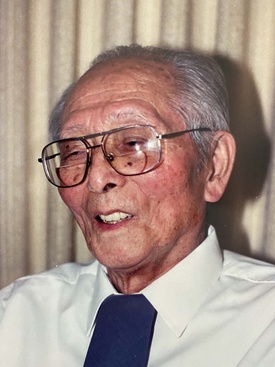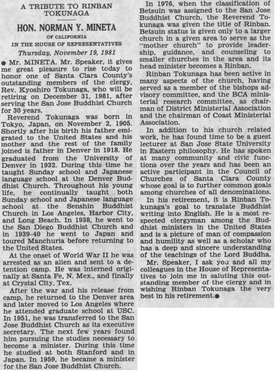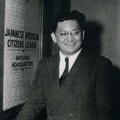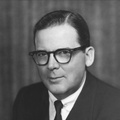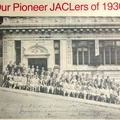Flipping through an issue of Men’s Health magazine, one usually expects a combination of articles and advertisements on healthy living and positive thinking. As part of my previous research on Buddhist Reverend LaVerne Sasaki, I couldn’t help but notice a headline from the November 1999 issue of Men’s Health that stood out. It was entitled “Holy High Roller Wins! Big Buddhist payoff!” I eagerly leafed through the pages of the article to see what the payoff of Buddhism was said to be, expecting to find a long article on the benefits of mindfulness and Buddhist teachings. Instead, I found something completely different: an interview with San Jose Rinban Kyoshiro Tokunaga, eighty-one years old, who had won $27,000 at the Reno slot machines.
The article began by commending Reverend Tokunaga on his past luck, which his family contended was born out of karma accumulated by virtuous actions over the years (though selective memory may have played a role in it). It then turned to an interview with the aged Tokunaga, who stated that he was less successful on his latest visit, but added, “sometimes you win by losing.” In offering justification for this aspect of Buddhist philosophy, he told a particular story from his own life:
A: I'll tell you a story. Friday, March 13,1942, was a very lucky day.
Q: Why?
A: That's when the FBI came after me. I went home to my apartment in Los Angeles and was opening the door with my key when the door opened from the inside. All my books were scattered on the floor. "Are you Mr. Tokunaga?' they asked. It was the first time anybody had asked my name in my own house. I got shipped to the county jail and then to a relocation camp in New Mexico. But they treated me fairly.
The journalist was puzzled to find any sense of “fairness” in such a story, but Reverend Tokunaga constantly emphasized that the tribulations of his own life, and his eventual success, demonstrated that karma would repay in the end.
While this story seems out of place for Men’s Health Magazine, it captures a rare glimpse of one of San Jose’s most revered Buddhist leaders and starkly reveals the tribulations faced by him and other Japanese Americans during internment. As a minister at San Jose’s Betsuin and one of the lone Issei plaintiffs on the NCJAR’s lawsuit that influenced the 1988 Civil Liberties Act, Kyoshiro Tokunaga’s life story and philosophy on karma are important lessons for scholars and activists.
Kyoshiro Tokunaga was born in Tokyo, Japan. His birthday is unknown, though he gave his official birthdate as November 2, 1905. At age 13, he immigrated with his parents to the United States, and settled in Denver, Colorado. He attended the University of Denver, and taught Sunday school and Japanese language at the Denver Buddhist Church. He then moved to Southern California, later working for the San Diego Buddhist Church in 1938 and continuing his language studies. From 1939 to 1940, the young Tokunaga embarked on a tour of Japan and Japanese-occupied Manchuria, visiting family and seeing part of the Japanese empire.
Because he taught Japanese language and visited Japan on multiple occasions, the FBI arrested Tokunaga on March 13th, 1942. From there, he was sent for internment in numerous Department of Justice Internment camps, starting in the Los Angeles County Jail, and cycling through the Tuna Canyon Detention camp near Los Angeles, Santa Fe and Lordsburg Camps in New Mexico, and ultimately the Crystal City Internment Camp in Texas. Reverend Tokunaga later described his time in camp as having felt the experience to be “incredulous and inhumane.” For four years, Tokunaga endured numerous hardships and near-death experiences that would shape his world views. He later shared his reflections on the camp years in another article, this time for the San Jose Mercury powerfully titled “There is a Karma for Nations.” While on the train from Tuna Canyon to Santa Fe Detention Camp, he recalled one of a few silver linings from his internment:
When I was on the train, I felt very uncomfortable because I was ill and had a high fever. A black porter on the train, he came up and saw I was ill. He sort of squatted down near me and said in a very low voice, ‘I can understand how you feel. We have been through this for hundreds of years.’ Those few words were very comforting to me.
Despite these comforting words, for most of the war years Tokunaga feared for his life. Shortly after his transfer to the Lordsburg Camp near the U.S. - Mexico border in July 1942, two internees walking en route to the camp were shot by army guards on the grounds of “trying to escape.” No autopsy was performed on the victims, and the local Lordsburg community raised money for the legal fees for the two accused soldiers’ court martial.
Most of Tokunaga’s sentence, however, was marked by assignment to labor details and finding ways to pass the time. While in camp, he developed a reputation as a home-run hitter on the camp’s baseball team, according to fellow inmate Reverend Junjo Tsumura. When the internees were forced to clean the soldier’s dance halls and latrines, Tokunaga joined a labor strike, resulting in confinement to barracks. Similarly, he was ordered to do menial labor while at the Santa Fe Camp, an experience that inspired another of Rev. Tokunaga’s stories on karma for Men’s Health:
One day, I was assigned to clean the officer's quarters. I was alone. So I took a screwdriver to the metal swivel chair. I loosened every screw so that it would collapse when the next person sat on it. I came back the next day and found that somebody - probably an American - had tightened every screw tighter than before. So I loosened them up again and eventually achieved my goal. I was young then.
Even after the conclusion of hostilities in September 1945, Tokunaga remained behind barbed wire. After stating in a hearing that he thought of returning to Japan, the Department of Justice sent him to the Crystal City Internment Camp in May 1946, where he remained for months until his final release.
The kindness from the black porter from his first trip had a strong impact later on him in life. When he was sent away from camp on a train to Denver, he recalled the cars being segregated between blacks and whites. Out of a sense of solidarity, he chose to sit in the black car. A conductor told him to sit in the white car, which immediately led him to think, “this is over for the Japanese but for the black people, they must come back from the war front, and they must return to different cars and different waiting rooms and different latrines.”
Upon being freed from camp, he returned to Denver. The shadow of the war lay on him. “When I came back from the camp,” he noted. “I found that all my books were gone from my apartment.” He then moved to Los Angeles, where Tokunaga enrolled at the University of Southern California as a graduate student in the Philosophy Department. It was in San Jose that he met his future wife, Marietta Ando, in 1950. They were married a year later in San Jose.
In 1951, Tokunaga received an offer to work with the San Jose Buddhist Church as executive secretary, with the opportunity to become minister. Although he started religious studies at Stanford University, Tokunaga eventually dropped out (he later claimed Stanford lost his master’s thesis). In 1959, Kyoshiro Tokunaga was appointed as a minister of the San Jose Buddhist Church. For years thereafter Reverend Tokunaga worked to both expand the congregation of the San Jose Church and to coordinate with other Buddhist churches in the Bay Area. In 1971, Reverend Tokunaga presented the opening benediction at Norman Mineta’s inauguration ceremony as the first Nisei Mayor of San Jose, an act that Mineta would remember well.
Five years later, the San Jose Buddhist Church received the honorific title of ‘Betsuin,’ designating it as a head church for a region. Following the retirement of Rinban Ejitsu Hojo in 1977, Tokunaga was graced with the title of Rinban. As Rinban, Tokunaga served as the leading Buddhist leader for the larger city of San Jose, advisor to other Buddhist churches in the area, and as a diplomat for the Buddhist community to other religious denominations. After twenty two years as a minister at the San Jose Betsuin, Rinban Tokunaga retired in 1981. In celebration of his retirement, then-Representative Norman Mineta presented a tribute to Tokunaga before the House of Representatives in Washington, D.C., calling him “a most respected clergyman among the Buddhist ministers in the United States and…a picture of man of compassion and humility.”
Despite his retirement, Tokunaga remained active in the public sphere. One of his most noted achievements was serving during the 1980s as a visible supporter of William Hohri’s National Council for Japanese American Redress (NCJAR). He later situated the redress movement in Buddhist terms: “As a Buddhist I believe there is a karma for nations as well as people. The American karma is the actions and deeds of the past. It is something we cannot escape.” William Hohri, in turn, looked to Rinban Tokunaga for both spiritual guidance and for help in establishing better dialogue between Christians and Buddhists. Hohri described Rev. Tokunaga, like famed Manzanar activist Harry Ueno, as in their “Confucian prime: their seventies.”
In 1986, Tokunaga agreed to be one of the plaintiffs listed on the NCJAR’s class action lawsuit. Tokunaga was the only plaintiff who had been confined in the Department of Justice Camps. Although by then he was already eighty years old, Tokunaga felt that he still needed to speak out against injustices like those he had experienced at the hands of the Department of Justice. His part in the lawsuit earned the attention of the San Jose Mercury, who profiled him as a leader of the San Jose Japanese American community.
Rinban Kyoshiro Tokunaga passed away on June 27, 2001 at the age of 95. As a minister and Rinban, Reverend Tokunaga went beyond the call of duty as a servant of the community. As an individual, Kyoshiro Tokunaga was someone filled with charm who confronted the tribulations of life with jest. When I asked Reverend LaVerne Sasaki about his friendship with Reverend Tokunaga, he recalled that Rinban Tokunaga’s lifelong dietary preference was daily San Jose tofu with Sake, and that he enjoyed Tanqueray Gin. Reverend Sasaki further recalled fondly their times golfing together, in particular Tokunaga’s ten attempts of swinging from a sand trap, and what he called their contribution to the Buddhist community’s role in supporting the Reno economy—the activity that so enthralled Men’s Health.
Special thanks to Frank Abe, Susan Hayase, Curt Fukuda, LaVerne Sasaki, Gerald Sakamoto, Naomi Sims, Ken Tokunaga, and Tetsu Tokunaga for their help with this article.
*This article was originally published in the Nikkei West in May 2021 and updated for Discover Nikkei.
© 2021 Jonathan van Harmelen


